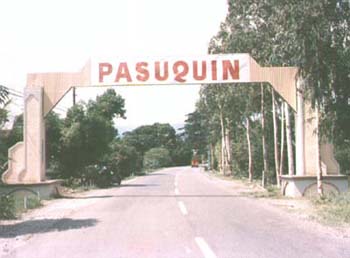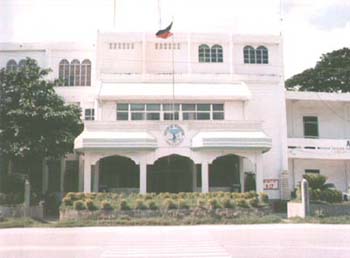

| Municipality of PASUQUIN |

Pasuquin, a town famous for its salt and biscucho products, is 17 kilometers north of Laoag City. It is 25 kilometers long town that lies on the coast of the South China Sea. It is bounded on the north by Burgos, on the east by mountain ranges of Vintar, on the south by Bacarra, on the west by the South China Sea. It has a land total land area of 152.1 hectares hills and mountain ranges, good for lumbering, abound on the eastern part. Some areas are elevated lands suitable for farming and agriculture, while sand dunes occupy the largest part. Like other towns of the province, Pasuquin also has two seasons, the wet and the dry seasons. These seasons are similar to those of the other towns in the province. There are two conflicting theories regarding the origin of the name of the town. One indicates miscommunication between the Spaniards and the natives. It said when the Spaniards were in the province, they asked the Itnegs in the place to help them find a better place where they could settle. A peg was driven somewhere by one of the natives. Then the Spaniards asked, "Donde esta el sitio?" (Where is the place?). The native answered "Pasuk Oni," which meant "the place of the peg." the Spaniards misunderstood their answer. They thought they were telling the name of the place, Pasukin. From then on the town was called Pasuquin.
On the other hand, there were those who claim that before the coming of the Augustinians friars, there were already people living in the place. At that time also there was a war between the lowland natives and the Kalanasan Yapayao tribe. After the war, traded with each other. During this time the Chinese pirates invaded many places and stole the properties of the rich natives. The natives devised a sort of warning signal by kidling a fire called paasok (asok means smoke; paasok means something that gives out smoke). One summer, the Chinese pirates attacked the place. Because of this, the people resolved to form a community to protect the people. An Apo Lakay (an old man who recognized as head of the place), appointed a wanawan (watchman) to stay. Upon seeing the invaders, he would kindle a paasok to warn the people and to call all the males to fight the invaders. The places were smoke was produce was just below the hill where wanawan stayed. Rice is the principal product of Pasuquin. It is mainly produced for home consumption. However, the more progressive farmers can produce more than what they need, so they sell the rest. Tobacco, corn, and sugarcane are also produce in a commercial scale. Salt making is another flourishing industry in Pasuquin. The business minded people have already look into possibilities of improving the salt making industry to derive more income from it. Barangays along the sea cost are engaged in fishing. Fishes of different kinds and seeweeds are abundant. Other people find, lumbering, cottage industry, mining industry to derive more income from it. |






